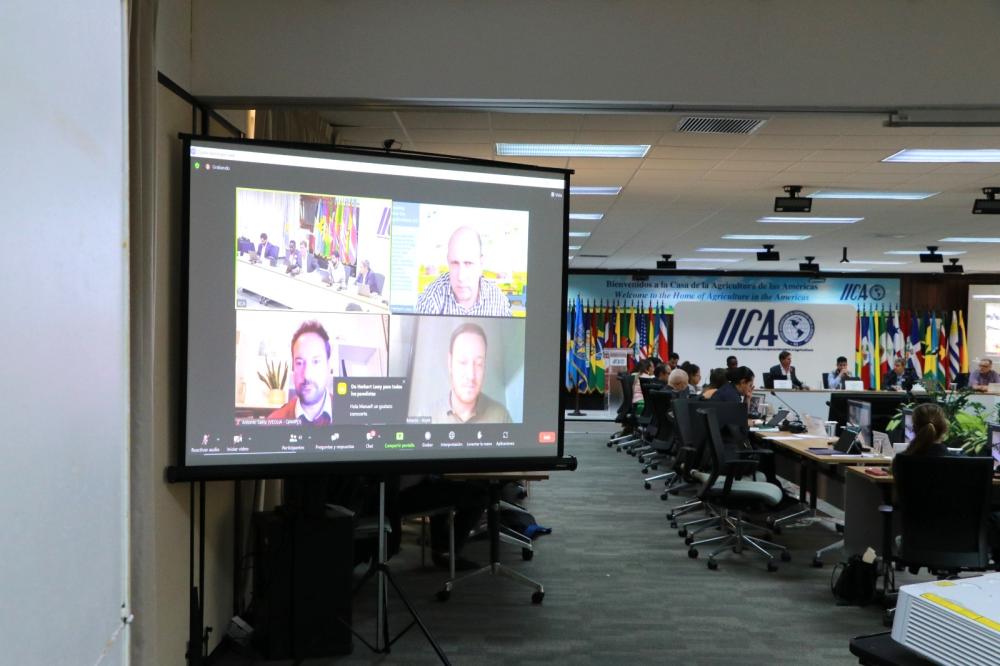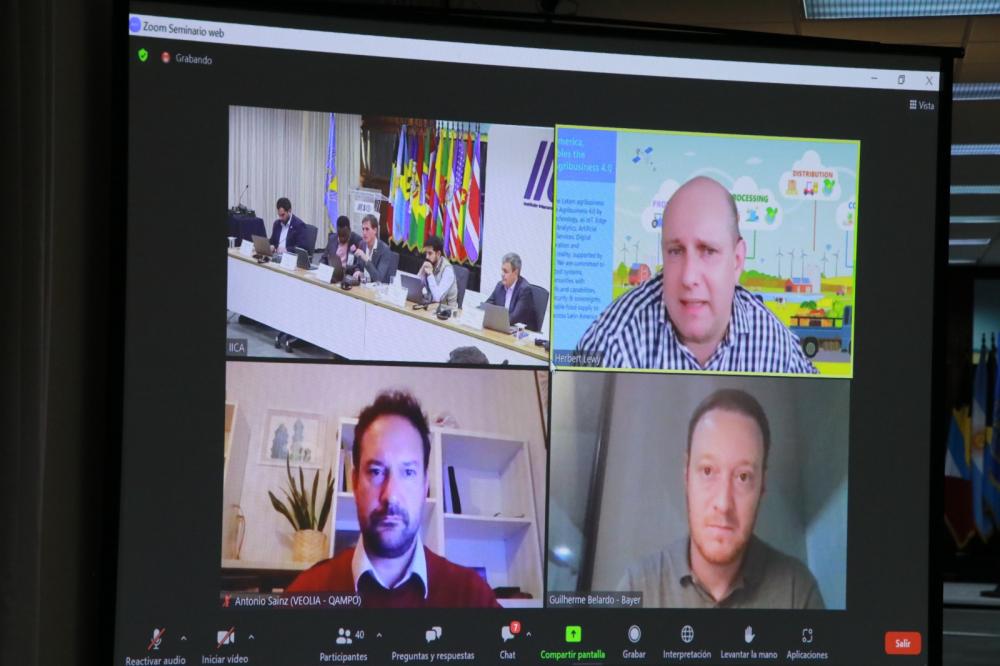Fostering partnerships between stakeholders that promote digitalization is key to accelerating the development of technological solutions for agriculture in the Americas

San Jose, 2 June 2023 (IICA). Establishing partnerships among stakeholders that foster agricultural digitalization is key to driving the development and acceleration of technological solutions that result in more productive and sustainable food systems and improve the quality of life in rural areas of Latin America and the Caribbean.
This was one of the conclusions of representatives of multinational companies Microsoft and Bayer who participated in a roundtable discussion aimed at sharing ideas for dynamic and inclusive digitalization in the region’s agriculture sector. The activity was carried out as part of the second edition of Digital Agriculture Week. Also participating were representatives of Veolia, a French company with offices in Latin America that specializes in integrated water and wastewater treatment and energy services.
Digital Agriculture Week is a forum aimed at promoting dynamic and inclusive agrifood digitalization in the region. It is organized by the Inter-American Institute for Cooperation on Agriculture (IICA) together with those three companies, The Yield Lab, CAF-Development Bank of Latin America, the International Fund for Agricultural Development (IFAD) and IDB Lab.
Participating as speakers were Herbert Lewy, General Manager of Microsoft Smart Agriculture and Bioeconomy for Latin America; Guilherme Belardo, Business Development and Partnership Lead at Bayer; Manuel Pérez, Director of Public Sector Business Development at Veolia; and Antonio Sainz, collaborator at the French company.
Data: A pillar for accelerating digital transformation
Bayer and Microsoft presented their jointly developed Azure Data Manager for Agriculture platform, a powerful example of the potential generated by partnerships between promoters of digitalization. They spoke to an audience comprised of 70 AgTechs in the Americas that already offer solutions for use in agriculture, as well as a wide range of stakeholders that attended the event in person and virtually.
The platform is designed to collect, analyze and process data from various sources, such as sensors, irrigation systems, satellites, drones and weather data, among others, which allows for capitalizing on high-quality data and accelerating the development of digital agricultural solutions.
Furthermore, it enables producers to make informed decisions and, in turn, improve the efficiency and sustainability of their crops.
“If you want to go fast, go alone. If you want to go far, go together. We believe in the importance of sharing innovations that are being generated at all levels and that encompass the region’s entire agricultural-livestock ecosystem. We decided to deliver a presentation at this forum together with our global partner Bayer, to show what types of partnerships are being developed, describe how AgTechs can participate as key players in the sector and discuss the emergence of new business models that embrace global, regional and local companies of various sizes. Our actions will always speak louder than our words”, remarked Herbert Lewy.
“In the agriculture world, what we hope is to become data-driven agribusinesses, to really utilize all this data to generate value for the entire agrifood ecosystem and especially for producers”, he added.

In the case of Bayer, the company offers its industry-leading expertise to business customers through AgPowered Services, a series of solutions that pull data from Azure Data Manager for Agriculture to provide timely information on crop health and growth as well as weather forecasts, among other elements.
Additionally, its FieldView digital platform, which it established six years ago, utilizes data from the satellite and weather sources of the solution created with Microsoft to generate information on factors that could limit agricultural production.
These initiatives seek to enable companies in the agrifood chain to accelerate digital innovation and create greater value.
“The goal is to create the first all-encompassing agribusiness platform and connect with all AgTech stakeholders and large companies related to agricultural machinery and raw materials. This fully integrated solution would allow for sharing data and developing better digital tools for farmers, to address their main challenges, which is extremely important to us”, explained Guilherme Belardo, of Bayer.
On the other hand, Veolia representatives presented their portfolio of digitalization solutions, which primarily focus on water provision and optimization.
“Not much can be digitalized in the world of agriculture without water. We want to draw closer to farmers”, said Manuel Perez, Director of Public Sector Business Development at the French company.
“The solutions we offer provide recommendations related to irrigation, plant health, plant yield, water optimization, soil and energy management; we integrate various solutions and are always looking for new technological components to offer to the agriculture sector”, remarked Antonio Sainz, of Veolia.
He explained that their solutions pull data related to climate variables, irrigation, fertilization and pruning from sensors, satellite stations, machinery and producers’ agronomic management operations, among other sources.
“Data in and of itself is useless. What is truly useful is information that has been interpreted as well as cross-checking of data to make decisions and consider solutions. This allows for providing farmers with simple proposals based on their objective, so that they can utilize the solution and benefit in a practical manner from technology”, he concluded.
More information:
Institutional Communication Division.
comunicacion.institucional@iica.int